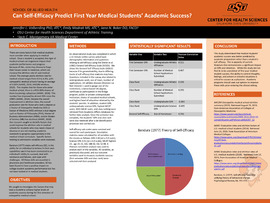| dc.contributor.author | Volberding, Jennifer L. | |
| dc.contributor.author | Madrak, Emily | |
| dc.contributor.author | Baker, Jana N. | |
| dc.date.accessioned | 2020-05-05T19:38:06Z | |
| dc.date.available | 2020-05-05T19:38:06Z | |
| dc.date.issued | 2020-02-28 | |
| dc.identifier | ouhd_volberding_canselfefficacypredict_2020 | |
| dc.identifier.citation | Volberding, J. L., Madrak, E., & Baker, J. N. (2020, Feb. 28). Can self-efficacy predict first year medical students' academic success? Poster presented at Research Day at Oklahoma State University Center for Health Sciences, Tulsa, OK. | |
| dc.identifier.uri | https://hdl.handle.net/11244/324263 | |
| dc.description.abstract | Background: Self-efficacy (SE), the ability for an individual to believe in their own capabilities, has been connected to an individual's ability to succeed, deal with resistance and failures, and cope with challenges, all skills that are essential for competent physicians. SE has been found to have a positive impact on college student academic performance, but has not been evaluated in medical students. The purpose of this study was to measure first year medical students' SE and to determine what characteristics impacted their academic success in their first semester of medical school. | |
| dc.description.abstract | Summary of Work: 61 (29 male, 32 female) first year medical students at a single osteopathic medical school were asked to complete the SE scale and additional demographics. Data was combined with undergraduate (UG) GPA, MCAT score, first semester GPA, and class rank. Basic descriptives, means, standard deviations, and Pearson correlation values were calculated. | |
| dc.description.abstract | Summary of Results: Four variables were found to be significantly correlated with first semester GPA (level of athletic performance of UG r=.311, p=.015; number applications submitted r= -.414, p=.000; UG GPA r=.488, p=.000; science GPA r=.467, p=.000) and three with class rank (number applications r=.355, p=.005; UG GPA r= -.483, p=.000; science GPA r= -.495, p=.000). General SE was significantly correlated to the size of hometown (r=.256, p=.049). | |
| dc.description.abstract | Discussion & Conclusions: This study determined that medical students' first semester academic success was better predicted by academic preparation rather than a student's self-efficacy. This is in contrast to current undergraduate literature that demonstrates a significant impact on GPA and retention. Self-efficacy may therefore be more applicable to astute clinical skills rather than pre-clinical academic performance. | |
| dc.description.abstract | Take Home Message: While this study did not find SE to be a predictor of first year medical student academic performance, the ability to control thoughts, feelings, and actions in stressful situations is critical to overall success as a physician. Academic programs should seek out options to assess and improve these skills prior to entering the clinical setting. | |
| dc.format | application/pdf | |
| dc.language | en_US | |
| dc.publisher | Oklahoma State University Center for Health Services | |
| dc.rights | The author(s) retain the copyright of have the right to deposit the item giving the Oklahoma State University Library a limited, non-exclusive right to share this material in its institutional repository. Contact Digital Resources and Discovery Services at lib-dis@okstate.edu or 405-744-9161 for the permission policy on the use, reproduction or distribution of this material. | |
| dc.title | Can self-efficacy predict first year medical students' academic success? | |
| osu.filename | ouhd_volberding_canselfefficacypredict_2020.pdf | |
| dc.type.genre | Presentation | |
| dc.type.material | Text | |
| dc.subject.keywords | academic excellence | |
| dc.subject.keywords | self-efficacy | |
| dc.subject.keywords | academic performance | |
